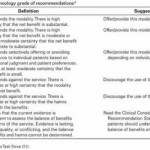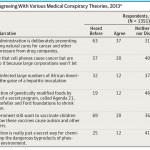alternative medicine
It should come as a surprise to no one that I'm not exactly a fan of "integrative oncology"—or integrative medicine, or "complementary and alternative medicine" (CAM), or whatever its proponents want to call it these days. After all, I've spent nearly ten years writing this blog and nearly seven years running another blog dedicated to promoting the scientific basis of medicine, and just this year managed to publish a lengthy commentary in a high impact journal criticizing the very concept of integrative oncology. Unfortunately, it seems to be the equivalent of the proverbial pissing in the…
(Orac note: I was away at Skepticon over the weekend, where I gave a talk entitled The Central Dogma of Alternative Medicine. (When the talk’s up on YouTube, I’ll provide a link, of course.) Because of all the fun and travel delays I didn’t get a chance to turn my slides and notes into a blog post yet. Also, I’m on vacation this week. However, this gives me the opportunity to resurrect a blog post from 2007, because I think the concept is interesting. I even use it in a slide that shows up in many of my talks (above). I’ve updated dead links and added some text to include relevant links to…
As this goes live I’ll be heading to the airport, my purpose being to wing my way to Skepticon 7, where I’ll be speaking tomorrow on a little ditty I like to call The Central Dogma of Alternative Medicine. It’ll be fun, and I’m looking forward to it. However, in true Orac fashion, I haven’t finished the slides and outline for my talk yet, something I hope to do on the planes (there are no direct flights to Springfield, MO from here) and the 3+ hour layover I have to look forward to in Chicago.
What this means is that I was busily tweaking my talk and making some slides last night instead of…
I’ve been a bit of a bad, bad boy. Well, not exactly. Rather, I’ve just been a bit lazy and/or forgetful. I know, I know. How can the ultimate Tarial cell-fueled supercomputer in the neat, compact form of a Plexiglass-encased cube of multicolored blinking lights be lazy or forgetful? Maybe “lazy and forgetful” are the wrong words. After all, my namesake (or should I say “‘nymsake”) Orac was well known for being easily distracted when he encountered an observation or question that interested him (such as black holes and limericks), so much so that it sometimes got the crew of the Liberator…
Quacks really hate Wikipedia.
It's understandable, really. Wikipedia has some fairly tight standards regulating its form and content. Quacks, thinking that because anybody can edit Wikipedia articles it must mean that they can edit the entries on their favorite bit of woo to their hearts' content in order to make it look more scientifically supported and to remove disconfirming information, are disappointed when they discover that it's not that easy. Now, I've been a critic of Wikipedia in the past, having found problems in entries on topics where I have deep knowledge and been concerned that…
Over the years, I've often likened alternative medicine to a religion—or even a cult. Basically, it requires belief in a set of precepts that have at best little and more commonly no evidence to support them that is often accompanied by magical thinking that a god-substitute, be it nature, one's body, or, of course, the magically mysterious "quantum," possesses magical powers that will protect one from all harm if one simply believes and acts on that belief. The belief systems that undergird various forms of alternative medicine are every bit as ridiculous from a scientific viewpoint as the…
Dr. David L. Katz is apparently unhappy with me. You remember Dr. Katz, don't you? If you don't, I'll remind you momentarily. If you do, you won't be surprised. Let me explain a bit first how Dr. Katz recently became aware of me again.
A couple of weeks ago, I posted a short (for me) piece about something that disturbed both Steve Novella and myself, namely An herbal medicine clinic at the Cleveland Clinic: Quackademia triumphant Steve had blogged about it as well a couple of days earlier. To my surprise, Maithri Vengala over at The Healthcare Blog noticed the blog post and asked me if I…
If there's one thing a budding skeptic quickly learns is that at the core of any good woo almost invariably lurks at least one conspiracy theory. At the risk of flirting a little too close to Godwin territory, this simple fact about pseudoscience, pseudohistory, and other non-evidence-based belief systems was first driven home to me around 15 years ago when I first started becoming interested in Holocaust denial. It didn't take too long for me to discover that at the heart of Holocaust denial are various conspiracy theories. Somehow the Jews, we are told, conspired to exaggerate the number of…
The vast majority of what is known as "alternative medicine" is quackery. Let's just get that right out front right from the very beginning of this post. That's where I'm coming from, and where I'm coming from is a science- and evidence-based viewpoint. To quote a cliche that is true and modified to my own view of medicine, there is no such thing as "alternative medicine." There is medicine that has been scientifically demonstrated to work. There is medicine that has been scientifically demonstrated not to work. And there is medicine that has not been shown to work. What makes up "alternative…
If there's one thing that I write that I don't feel I repeat too much (although some might disagree), it's that, unlike other centers and institutes at the National Institutes of Health (NIH), there is not, and never was, a compelling scientific justification for the National Center for Complementary and Alternative Medicine (NCCAM) to exist as a separate entity. There is nothing that NCCAM does that couldn't be done just as well in other parts of the NIH, with the exception of research into modalities with such low prior plausibility and such fantastical proposed mechanisms of working that…
Recently, I got an e-mail from someone who had just discovered my blog that made me think a bit, which is usually a good thing. At least, in this case it was. Basically, this reader asked me a question I hadn't been asked in a very long time and hadn't thought about in a very long time, specifically: If I had to pick just one and only one, what is the single most characteristic difference between alternative medicine quackery and science-based medicine? True, there are several key differences, and I'm sure many of you could tick off a list of five to ten characteristic differences without…
Mike Adams (a.k.a. the "Health Ranger") has been a regular blog topic for several years now. There are many reasons for this, not the least of which is that, among supporters of quackery, no one quite brings the crazy home the way Mike Adams does, be it writing antivaccine rap songs, abusing dead celebrities by claiming they would have survived if only they had used whatever quackery Adams supported at the time or painting them as victims of big pharma, or conspiracy mongering on a level that make Alex Jones blush. Truly, Mikey has a special talent among woo-meisters. Joe Mercola might have…
Sometimes, between blogging, a demanding day (and night) job doing surgery and science, and everything else, I embarrass myself. Sure, sometimes I embarrass myself by saying something that, in retrospect, I wish I hadn't. More often, I embarrass myself by letting things slide that I shouldn't. For instance, when friends send me a prepublication copy of their books, I should damned well read them, don't you think? So it was that Paul Offit sent me a copy of his latest book, which just hit the bookstores and online outlets this week, Do You Believe in Magic? The Sense and Nonsense of…
For a long time, going back almost to the beginning of this blog eight and a half years ago, I've referred to the "bait and switch" of alternative medicine. What I mean by that is the manner in which advocates of alternative medicine—or, as they like to call it these days, "complementary and alternative medicine" (CAM) or, more recently still, "integrative medicine"—co-opt perfectly science-based modalities like diet, nutrition, and exercise as being somehow "alternative." Alternatively, they woo-ify such science-based modalities and then claim them as CAM. Either way, they deceptively give…
Cancer is a bitch. Depending upon what organ is involved and what kind of cancer it is, it can be incredibly hard to cure. All too often, it is incurable, particularly when it involves the brain, pancreas, esophagus, or other organs. People wonder why, after over 40 years of a "war on cancer," we don't have better treatments and more cures. As I've explained before, it's because cancer is incredibly complex, and cancer cells have incredibly messed-up genomes. Even worse, cancer uses evolution against any efforts to treat it, producing such marked heterogeneity among tumor cells that not only…
Two years ago I was dismayed to find that a pair of crank authors had managed to slip a pseudo-archaeological paper into a respected geography journal. Last spring they seemed to have pulled off the same trick again, this time with an astronomy journal. Pseudoscience is after all a smelly next-door neighbour of interdisciplinary science.* When I realised that the second paper was in a bogus Open Access journal, I drew the conclusion that the authors had fallen for a scam, paying the OA fee to get published in a journal whose academic standing they had severely misjudged. That's still my…
That Dr. Mehmet Oz uses his show to promote quackery of the vilest sort is no longer in any doubt. I was reminded yet again of this last week when I caught a rerun of one of his shows from earlier this season, when he gazed in wonder at the tired old cold reading schtick used by all "psychic mediums" from time immemorial, long before the current crop of celebrity psychic mediums, such as John Edward, Sylvia Browne, and the "Long Island Medium" Theresa Caputo, discovered how much fame and fortune they could accrue by scamming the current generation of the credulous. Speaking of Theresa Caputo…
One characteristic of cranks, quacks, and pseudoscience boosters is a love-hate relationship with science. They desperately crave the respectability and validation that science confers. In the case of medicine, they want to be seen as evidence- and science-based. On the other hand, they hate science because it just won't given them what they want: Confirmation and validation. The reasons, of course, are obvious; their preferred ideas about disease and modalities to treat it are not rooted in science. Rather, they're usually based in either prescientific concepts of how the human body works…
Another year, another Breast Cancer Awareness Month.
While most people who have either been touched by breast cancer or who have a professional interest in it, the significance of Breast Cancer Awareness Month is that it is a time, well, to increase awareness and to promote breast cancer research. There is another side to Breast Cancer Awareness Month, however, and it's not just the question of its excessive commercialization, which concerns some people. Rather, inevitably, just as the vaccine-autism quacks have come out of the woodwork for Autism Awareness Month each April, each October…
For my international readers, it's a holiday here in the U.S. That means I plan on taking it easy, which means I've decided on doing, in essence, a "rerun." I chose this particular rerun based on my post from last Thursday. I thought that rerunning this particular post is a good reminder of what the cost of eschewing science-based therapy for breast cancer can be, and that price is horrible. This particular post dates back to 2006; so, if you haven't been reading the awesomeness that is my blog that long, it's new to you. I'll be back with new Insolence tomorrow.
I've written before about how…


